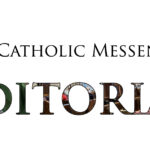Tax reform may take center stage in the Iowa Legislature this winter, and not just because Congress hastily overhauled the federal tax system last month. It’s been 32 years since Iowa enacted tax reform and some legislators believe an overhaul is overdue. The question for us, as faithful citizens: how will tax reform serve the common good? What are the ramifications for the least among us?
Shouldn’t we focus on more urgent issues such as Iowa’s privatized and distressed Medicaid program which serves 600,000-plus Iowans; children’s health care coverage; mental health care; and the lack of affordable housing, among other issues?
Gov. Kim Reynolds believes tax reform will benefit workers and employers by freeing up capital that will go toward bigger employee paychecks. What assurances do we have that businesses won’t use the extra money to increase shareholders’ earnings at the expense of lower-income Iowans living paycheck to paycheck?
In 2003, the Iowa Catholic Conference (ICC), the public policy arm of the state’s bishops, issued a statement on taxation, which remains relevant today. Take, for example, this paragraph:
“Taxation in any form should be based on one’s ability to pay. If Iowa tax policy is to remain faithful to Catholic teachings, it should first assure that the system collects taxes according to one’s ability to pay. Catholic social teaching supports a more progressive form of taxation. Our contribution to the common good should reflect our blessings.”
Contemplate that paragraph; then read the full statement (https://tinyurl.com/yaw9thx6).
Share it with your legislators (www.legis.iowa.gov) and ask them to apply the bishops’ principles to any discussion about tax reform. Another good resource on principles for evaluating tax policy: the Iowa Fiscal Partnership (https://tinyurl.com/ycdnvhkj).
The ICC’s legislative priorities for 2018 address issues that have a good chance of being considered by legislators, and are not the bishops’ only priorities:
• Supporting an Education Savings Account (ESA) program and enhancements to the Educational Opportunities Act/School Tuition Organization (STO) tax credit.
The bishops view nonpublic schools as among the best anti-poverty programs that speak to the development of the whole person. ESAs are an efficient means to support parents and children, the bishops said. The STO tax credit program assists low-income students. It offers $12 million in tax credits to donors, which helps nonpublic schools raise about $18 million in scholarships. The ICC hopes for an increase to the STO program cap. Opponents say funding for non-public schools takes money away from public schools. But a Department of Revenue study shows that if STO scholarship recipients were to attend public schools instead, it would have cost the state an additional $12.6 million in 2016-17.
• Supporting final passage of Senate File 359, outlawing trafficking in fetal body parts.
This bill, which passed last year in the Iowa Senate 43-6, would restrict the use of fetal tissue for research following an elective abortion.
• Supporting an increase in the state’s minimum wage.
The ICC hopes for a boost in Iowa’s minimum wage from the federal minimum of $7.25 per hour.
• Opposing Senate File 481 related to treatment of immigrants.
Law enforcement agencies would be required to honor any immigration detainer request from the federal government, even those without a criminal warrant attached. This would be a significant change of practice for many local law enforcement staff, ICC Executive Director Tom Chapman said. “What’s the greater good? What’s merciful? We’re asking for a merciful policy.”
• Opposing reinstatement of the death penalty.
In response to the slaying of two police officers in Des Moines, talk of reinstating the death penalty is a real concern. Legislation would likely target individuals convicted of killing law enforcement officers.
For the full list of legislative priorities, go to the ICC website (https://tinyurl.com/yb5smmvg).
Study the issue you are most passionate about, using the resources listed in this editorial. Check out the tool box on the ICC website (https://tinyurl.com/yc8a842r) to learn more about the legislative process and to receive action alerts. Download the “Voter Voice” app on your iPhone or Android device.
If tax reform is addressed, insist that it be done with a goal of serving the common good. But other issues should be addressed. Make your voice be heard. Stay in touch with your legislators; convince them to work for all Iowans, especially those living on the margins.
Barb Arland-Fye, Editor
arland-fye@davenportdiocese.org











